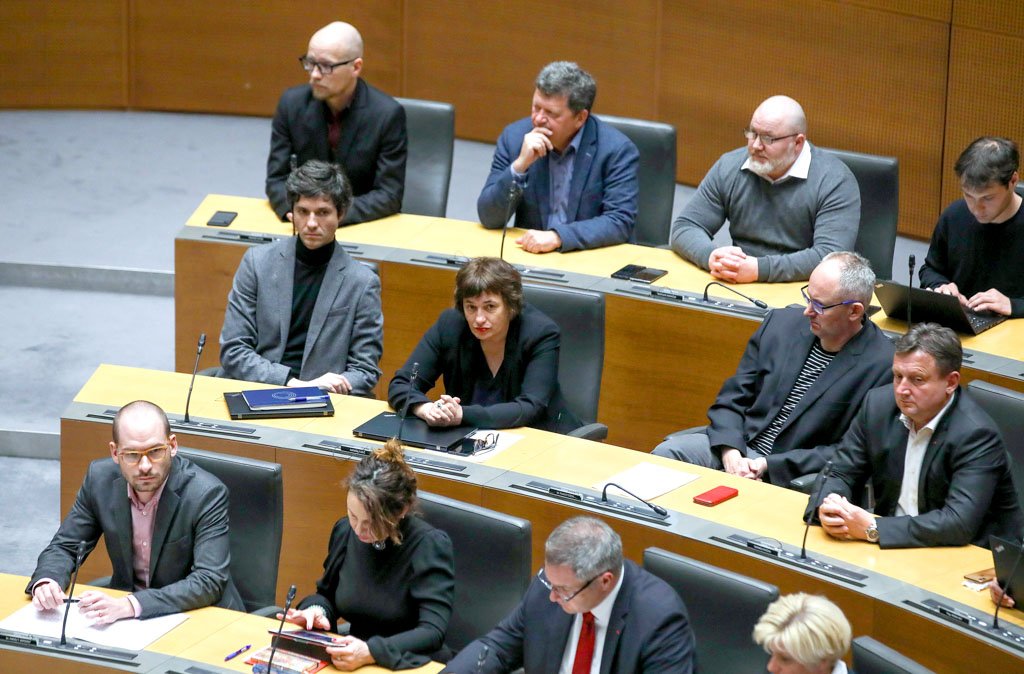After the failed attempt at replacing the Speaker of the National Assembly, controversy has arisen over whether the coalition still has a majority in the National Assembly or not. Tuesday’s vote unequivocally proved that there is nothing to worry about, as 46 MPs voted in favour of approving the decision on the inadmissibility of the legislative referendum on an amendment to the Implementation of the Republic of Slovenia Budget for 2021 and 2022 Act, which exempts military investments from budgetary constraints.
After the vote, the Levica party (the Left), which has always been considered a major opponent of any kind of funding for the Slovenian Armed Forces, has already announced that it will challenge the decision at the Constitutional Court of the Republic of Slovenia.
The government already adopted a proposal for the resolution on the inadmissibility of the referendum on Monday, and clearly emphasised that the amendment refers to the content on which, in accordance with the highest law in the country – the Constitution of the Republic of Slovenia, calling a legislative referendum is not admissible. The other opponents of the referendum from the parliamentary ranks agreed with this, and during the presentation of the positions of the parliamentary groups, they drew attention to the regulations prohibiting a referendum on laws regarding the implementation of the budget. Given that the amendment, which the Levica party is particularly bothered by, offers solutions regarding the fulfilment of Slovenia’s obligations in the field of defence, this was highlighted as an especially positive thing.
Let us remind you of what happened beforehand. After the government session, the Ministry of Finance pointed out that the Constitution of the Republic of Slovenia stipulates that a referendum may not be called on laws on taxes, customs duties and other obligatory duties, and on a law adopted for the implementation of the state budget. “Laws for which the Constitution excludes the admissibility of a referendum, protect important constitutional goods, including the sources of financing for the state budget, as well as the implementation of the state budget,” they wrote in a press release. Given the very legal nature of the state budget, the existence of a law governing its implementation is a necessary condition for its actual implementation and also the realisation itself. “Since the budget does not determine the rights and obligations of citizens and other legal entities, the said law is of a technical nature. The aim of the said law is to legalise the solutions necessary for the smooth implementation of the adopted budget, as it regulates the system of procedures for the preparation and execution of the state budget and other elements of the state’s financial operations,” they made it clear, according to the Slovenian Press Agency.
The opposition claims that this is an attack on the Constitutional Court
In addition to the SDS, NSi and SMC parties, the decision on the inadmissibility of the legislative referendum on the amendment to the Implementation of the Republic of Slovenia Budget for 2021 and 2022 Act was also supported by the SNS and DeSUS parties and the deputies of the two national minorities. The opposition, which opposed the decision on the inadmissibility, stressed that the article concerning the financing of the Slovenian Armed Forces was added into the law on the implementation of the budget subsequently, which is allegedly unconstitutional. Former president of the SD party, Dejan Židan, and the leader of the parliamentary group of the Levica party, Matej T. Vatovec, agreed that this was an attack on the Constitutional Court.
In addition to the Levica party, which has already announced that it would challenge the decision in the Constitutional Court, accusations against the government and the coalition also came from the SAB, LMŠ and SD parties. Namely, they defended the position that certain provisions were included in the amendment, which do not belong there. According to them, with this, the coalition even bypassed the decision of the highest court in the country.
Following the adoption of the Act on the Provision of Funds for Investments in the Slovenian Armed Forces in the Years 2021 to 2026, both the Levica and the SD parties submitted signatures for calling a subsequent legislative referendum. The day after that, the coalition overwhelmingly upheld the decision on the inadmissibility of the referendum, and the Constitutional Court later suspended the implementation of the legal basis for long-term military investments until the final decision on the constitutionality of the law.
Despite the fact that the opposition and its subordinate media hoped that the coalition would not be able to gather enough votes, the opposite happened. Namely, the 46 votes in favour of the decision prove that the coalition remains strong and that the opposition’s wet dreams of taking power will have to be put on hold for a while longer.
Nina Žoher


